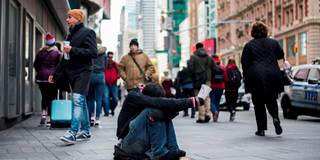Around the world, the shame felt by those enduring extreme economic hardship can become a trap. Only when policymakers grasp that dignity and self-respect are prerequisites in the struggle against privation – rather than outcomes of its alleviation – will the world have a fighting chance to eradicate poverty in all its forms.
BRIGHTON – Being poor is a highly shameful experience, degrading one’s dignity and sense of self-worth. While the manifestations and causes of poverty differ, the humiliation that accompanies it is universal. Recent research conducted at the University of Oxford found that from China to the United Kingdom, people facing economic hardship – even children – experience a nearly identical assault on their pride and self-esteem.
Yet, despite the clear evidence linking poverty to psychological distress, policies tacking poverty do not typically take shame into account. Rather, poverty reduction efforts tend to focus on tangible manifestations of deprivation such as lack of income or education. As a result, solutions to poverty often implicitly assume that more material wealth or improved living conditions will automatically translate into non-tangible benefits, including improved mental wellbeing.
This lack of focus on the “psychosocial” side of poverty – the interaction between social forces and individual attitude or behavior – is misguided. If we are to alleviate human suffering and achieve the UN’s premier Sustainable Development Goal of ending poverty “in all its forms” by 2030, addressing the intrinsic and instrumental roles that shame plays in poverty must be front and center in our efforts.

BRIGHTON – Being poor is a highly shameful experience, degrading one’s dignity and sense of self-worth. While the manifestations and causes of poverty differ, the humiliation that accompanies it is universal. Recent research conducted at the University of Oxford found that from China to the United Kingdom, people facing economic hardship – even children – experience a nearly identical assault on their pride and self-esteem.
Yet, despite the clear evidence linking poverty to psychological distress, policies tacking poverty do not typically take shame into account. Rather, poverty reduction efforts tend to focus on tangible manifestations of deprivation such as lack of income or education. As a result, solutions to poverty often implicitly assume that more material wealth or improved living conditions will automatically translate into non-tangible benefits, including improved mental wellbeing.
This lack of focus on the “psychosocial” side of poverty – the interaction between social forces and individual attitude or behavior – is misguided. If we are to alleviate human suffering and achieve the UN’s premier Sustainable Development Goal of ending poverty “in all its forms” by 2030, addressing the intrinsic and instrumental roles that shame plays in poverty must be front and center in our efforts.